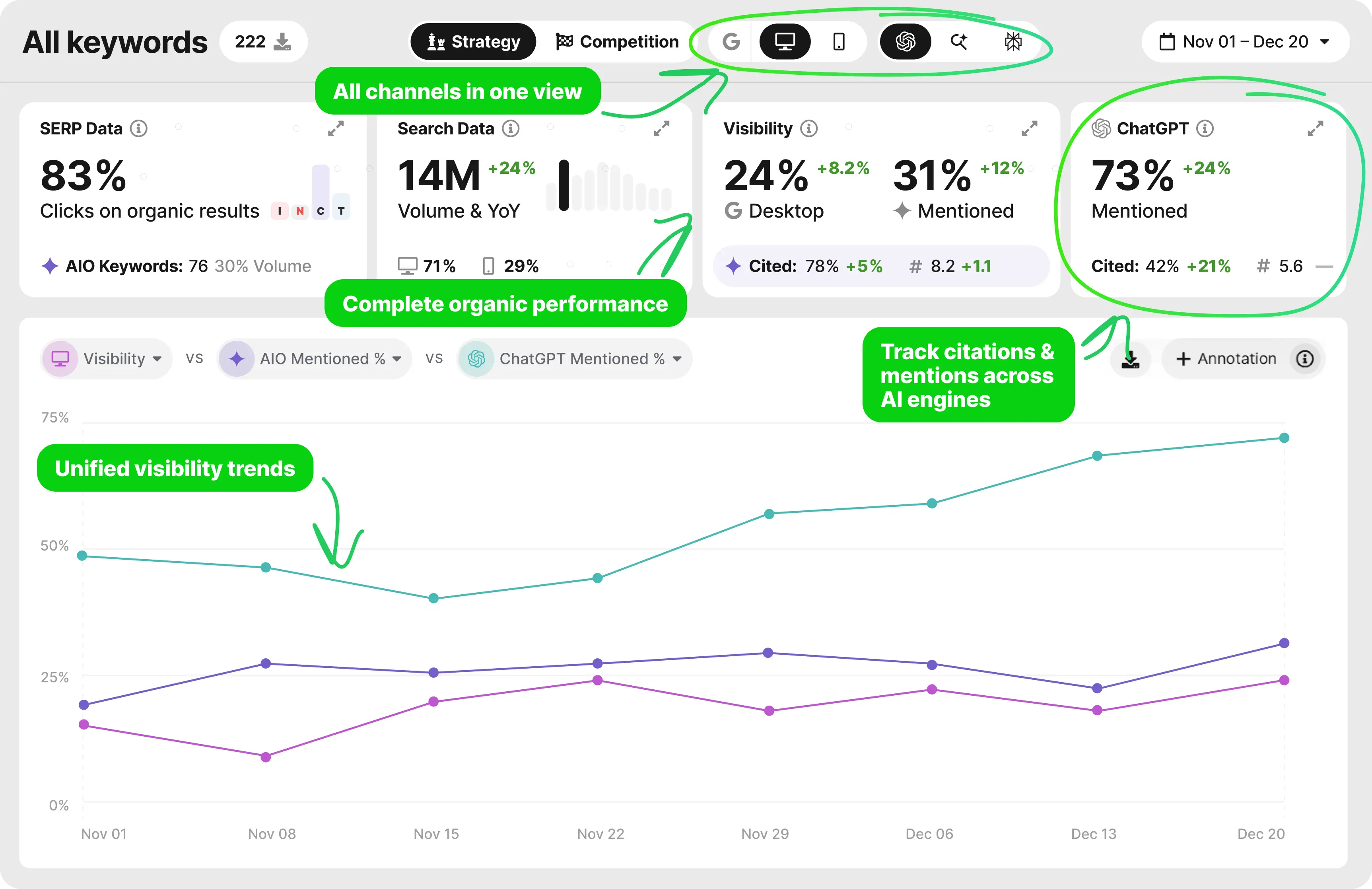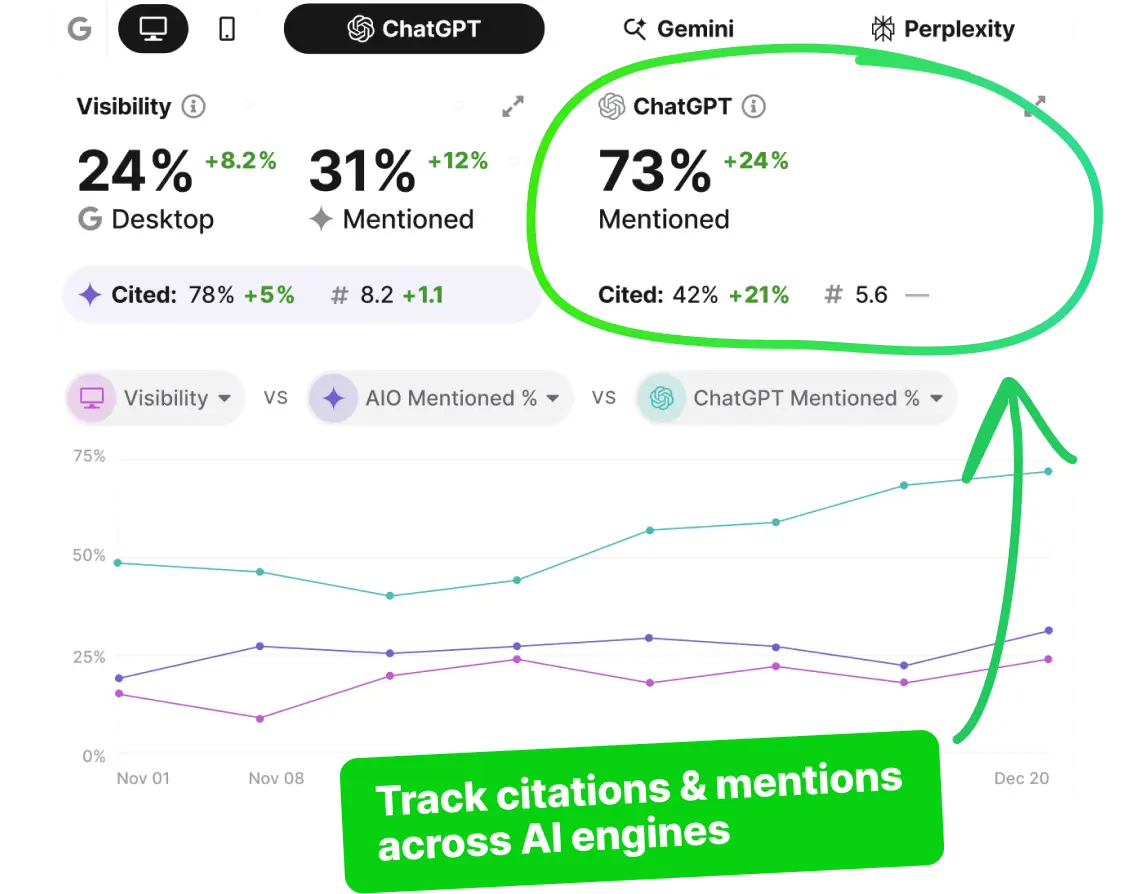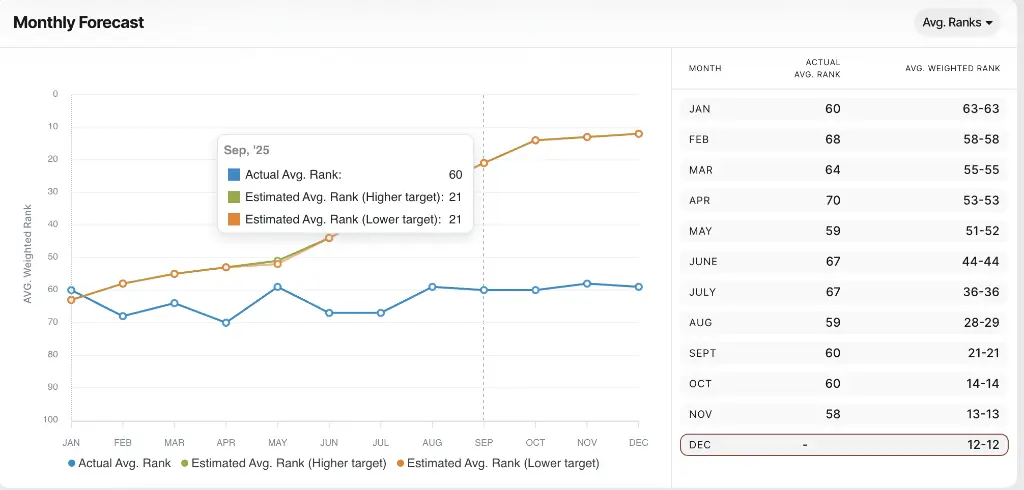Track Your Complete
Organic Performance.
Google + AI Overviews + ChatGPT/Gemini/Perplexity.
One keyword strategy. One unified dashboard. Your Data—Unrestricted access.


Trusted by agencies and brands worldwide
Search Is Now Fragmented.
Your Tracking Shouldn't Be.
Your customers use Google, AI Overviews, ChatGPT, Gemini, and Perplexity. Most tools track these separately — with different methodologies, different dashboards, and incomplete data.
- You can't see your complete organic performance
- Your reporting is fragmented and confusing
- You're making strategic decisions on partial data
SEOmonitor Built A Different Way.
Track Keywords, Not Prompts.
Here's Why.
One Keyword = Thousands of Prompts
When you track a keyword like 'running shoes,' you automatically capture tens of long-tail prompts like 'What are the best running shoes right now?' One keyword covers the entire intent.
Real Demand, Not Guesswork
Keywords have verified search volume from Google. Prompts don't. When you weight performance by real demand, your metrics actually mean something.
Same Strategy, Every Channel
Same keywords, same dashboard, same methodology across Google, AI Overviews, ChatGPT, Gemini, and Perplexity. See the effects ripple through ALL channels.
Win Clients With Data.
Prove ROI With Confidence.
PITCH
- Draft campaigns
- Traffic predictions
- Business case builder
WIN
- Activate campaign
- Daily rank tracking
- Connect GSC & Analytics
EXECUTE
- AI Content Writer
- Prioritization
- Content Audits
PROVE
- Unified reporting
- Client dashboards
- Prove ROI to clients
Finally See Your Complete Organic Performance in One View.
Track Google rankings, AI Overviews, and ChatGPT/Gemini/Perplexity citations — all with the same keyword strategy. No more fragmented reporting.
- Same Keywords, Every ChannelYour SEO strategy tracked across all organic touchpoints
- Daily Google + Weekly AI SearchThe right frequency for reliable data
- Complete Competitor IntelligenceTrack all competitors in your search landscape automatically
- Unlimited UsersYour entire team included, no per-seat fees
Strategic Content That Ranks.
Created and Published Autonomously.
Not just another AI writing tool. A complete content marketing agent that handles the entire workflow — from finding topics to publishing to tracking performance.
- Strategic Topic DiscoveryAI finds topics your site can actually rank for, based on your authority
- Built-in Fact CheckingEvery article verified before publishing, no hallucinations
- Automatic Performance TrackingSee how articles rank in Google, appear in AIO, and get cited in ChatGPT
Based on 657 published articles from the AimUP case study
Read the Case StudyAward-Winning Forecasting Methodology.
Trusted by Agencies Worldwide.
Turn ranking improvements into traffic projections. Generate business cases that show clients exactly what you'll deliver — with methodology so accurate, competitors copied it.
AI-Recommended Targets
Realistic goals based on your site's actual authority.
Forecasting Inputs Log
Keyword Data
PROCESSING
Analyzing 3,500 keywords for opportunity...
Seasonality
DETECTED
Seasonality detected: Peak in Q4 (Nov-Dec)
CTR Model
APPLIED
Applying 2025 Blended Model (Google + AIO)
Difficulty
SET
Baseline difficulty established: Medium
Month-by-Month Projections
Traffic forecasts adjusted for seasonality and SERP changes.

AI Overview Impact
CTR calculations that account for zero-click reality.
Search Vol
2.4M
Search Vol YoY
+12%
SERP Features
CTR Impact
-15% (Zero-Click)
CALCULATING
Pitch-Ready Exports
Business cases that close deals.
SEO Business Case 2026
Generated Dec 16, 2025
Executive Summary
Strategic Analysis
STRENGTHS
OPPORTUNITY
And There's More. All Included.
Content Audit & Cannibalization
Automatically detect pages competing for the same keywords, intent mismatches, and content gaps. Fix issues before they hurt your rankings.
AI-Powered Keyword Research
Full keyword strategy in minutes. Automatic clustering, intent detection, and irrelevant keyword filtering. Start with a URL, get a strategy.
Keyword Vault
Track unlimited keywords with monthly updates — included in your plan. Monitor your entire keyword universe without paying daily tracking prices.
GA & GSC Integrations
Connect Google Analytics and Search Console to see real traffic alongside rank data. Prove ROI with actual clicks, not just positions.
Different Economics. By Design.
Pay for data. Access is free. Nothing hidden behind add-ons. Most tools charge per user or export. We built the opposite model.
Unlimited Users
Your entire team included. No per-seat fees, ever.
Full API Access
Automate reporting and integrations. No restrictions.
Pay for Data
5× more keywords for the same budget as competitors.
"This isn't about being cheaper. It's about getting 5× more data for your budget."
View Pricing Plans →Trusted by Agencies & Brands
"I love the AI Overview reporting from SEOmonitor. It's the only tool I'm seeing that provides that kind of tracking."

"We've increased our team's productivity by 10× with SEOmonitor. The AI Content Writer alone saves us 100+ hours monthly."

Common Questions
Everything you need to know about the transition to unified organic tracking.
Ready to See Your Complete
Organic Performance?
Start your free trial. Get automatic keyword research and a complete SEO strategy for your website.












